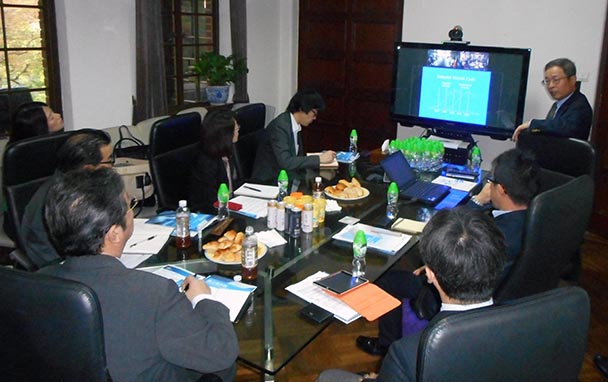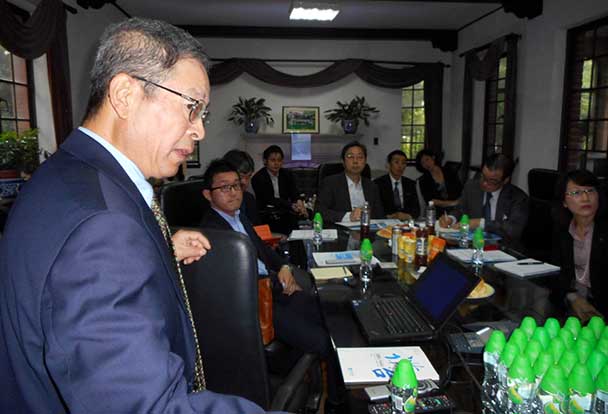With China’s real estate industry continuing to be one of the hottest topics for discussion, CKGSB and KPMG recently held their 6th joint breakfast seminar, with CKGSB Professor of Organizational Behavior Yan Aimin speaking to an audience of senior executives in Shanghai, and, via video link, to a similar crowd in Beijing.

CKGSB Professor Yan Aimin (standing, far right) delivers a talk at a breakfast seminar in Shanghai, and, via video link, to Beijing
Professor Yan opened by talking about the pace of change in China today. He said a house in the US that has risen 20% in value over 15 years might be seen as a good investment; in China, a similar rise over 15 months might be seen as a disappointment. Meanwhile, salary increases might be expected to total around 3-5% per year, but stories today abound of investors in the Chinese stock market doubling their money in just a few weeks. In short, everything is unpredictable.
Professor Yan added that while Silicon Valley in the US is often seen as the “home” of the internet, the US has yet to see as rapid a transformation as the one currently being experienced by China. He pointed out that in China the government plays a very strong role – the very “visible hand” of the state as opposed to the “invisible hand” of the US government.
Given so much change in the current environment, Prof Yan asked the question first posed by renowned management scholar Charles Handy:
What should an organization do when facing an external environment where the only thing that is predictable is nothing is predictable?
Professor Yan then turned his attention more specifically to the current environment in China, highlighting the many radical changes that had occurred, including the control of real estate prices, the anti-corruption campaign which is affecting the luxury goods business as well as hotels and restaurants, and the drive to promote innovation and entrepreneurship.
As China’s growth rate slows, Prof Yan said that this would result in an increasing problem for new graduates looking for jobs. Moreover, geopolitical issues also have an effect on business, with China’s relations with Russia, the US and Japan all having profound economic implications. For example, Prof Yan said that many Japanese companies have withdrawn from China over the past 15 years due in part to fraught bilateral ties.
Disruption created by the internet was another aspect that Professor Yan focused on. Many people today browse in stores, take some pictures of the items they want, before buying online, leaving companies complaining and retail stores such as Suning, Best Buy and Gome closing in droves. Purchasing through the internet currently accounts for just 7% of total sales, but that figure is predicted to soar. In addition, most purchases are small-ticket items, but with jewelry and even cars now available online, this is also expected to change
The key issue, Prof Yan said, is that value transfers along the value chain as a result of bargaining power shifts, as evidenced by the “smile” curve (see below).
Prof Yan pointed to two clear industrial growth cycles in history, remarking that it was after 1990-2000 that China became the world’s factory. He also highlighted the government’s recent focus on “Internet +”, saying that Premier Li Keqiang believes the internet is the main force driving the economy today.
Professor Yan then laid out the bigger picture, asking what the future of the traditional manufacturing sector would look like in 5-10 years, as well as the traditional service industry and the internet sector itself, before concluding that it is impossible to predict given how much change we have already seen. 30 years ago, for example, computer manufacturers made a lot of money, but present-day margins are very low, and so many companies have tried to expand into the software sector as a way to increase revenue.
Prof Yan then analyzed the case of IBM, which sold its core hardware business to Lenovo in 2009 and now makes powerful mainframe computers, in which they corner the market. But traditional businesses, he said, have seen revolutionary change and the massive structural and cultural changes at IBM has seen the firm effectively transform from a manufacturing company into a consulting company, greatly improving profitability as a result.

Professor Yan concluded by outlining some potential avenues through which a company can transform its business, including lower costs, operational excellence, transforming its business model, leveraging competitive resources and capabilities, reorganizing internally and introducing vertical integration.
A full and lively discussion followed with attendees from both Beijing and Shanghai, including energy and petrochemical industry expert Frank Chou, Bank of Japan GM Tomoyuki Fukumoto and Shunji Miyajima, CEO of Parker Engineering.